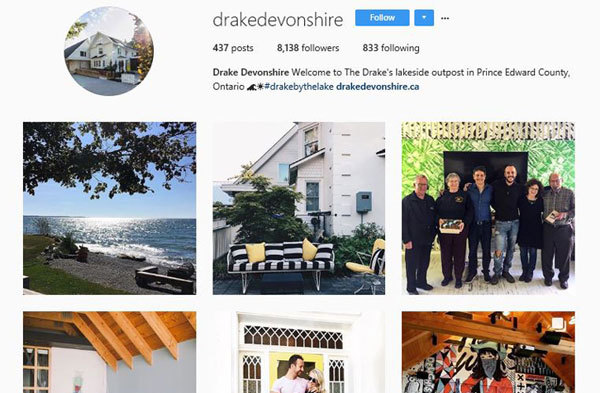✕

Column: industry Tag: Social media platforms.hotels Published: 2017-10-11 10:58 Source: Author:

Canada-based hospitality brand The Drake switched to making an Instagram account for each property after changes to the platform made it easier to switch from one account to another. (Screenshot: The Drake Devonshire’s Instagram)
GLOBAL REPORT—Social media platforms are constantly changing, and sources said they’re consciously working to make these changes work for their hotels.
Instagram remains a focal point for showing off hotel properties, sources said, but Twitter and Facebook are great tools for engaging with customers and providing updates about a hotel company, brand or individual property.
Stephanie Ofreneo, social marketing and digital branding manager at social media consultancy The Social Element, said hotels are becoming more “digitally savvy” with offerings such as keyless entry and online check-in. As a result, she said, it’s becoming more important that “the speed of response on social media platforms … (matches) the real-time experience in hotels.”
As for platform trends: “We’ve seen Facebook as a staple when it comes to marketing content and engaging with customers. The very visual Instagram also plays an important part in selling a concept, idea or lifestyle to a wider audience,” she said. “Instagram is excellent for (taking) a consumer through an experience that they want to be part of, especially giving a (peek) of a location that they’re curious to visit and then entices them to come—through Instagram stories and feed.”
She added that Twitter is used mostly to engage with customers, “and a simple shoutout to an @ tweet goes a long way, especially if the voice feels authentic.”
Platform changes
Speaking of Twitter, the platform recently increased its character limit to 280, which can allow for better customer-service engagement, Ofreneo said. There’s also a “buy now” feature available across most social media platforms, which plays “an important part in social marketing in the hotel industry,” she added.
“Often special offers or experiences are sold directly via social, making the process to buy a holiday or hotel room incredibly simple and quick,” she said. “But understanding who your audience is and how they behave online is a vital step in understanding which aspects of social will work best.”
When it comes to creating a social strategy, Ofreneo said she “encourages brands to develop a tone of voice that not only suits the business internally, but resonates well with customers.”
“It’s less about the marketing content being pushed out, or the ad spend, but rather how you manage and engage with your community,” she said.
Hoteliers’ social strategies
Instagram recently rolled out multi-account functionality, which makes it easier for users to manage and log in and out of accounts.
In response to this increased functionality, Canada-based hospitality brand The Drake created separate Instagram accounts for each of its properties, said Rachel Yeager, senior manager of marketing for the brand.
She added that Instagram is The Drake’s main platform because it gives the company a chance to show off design, food and beverage, and other elements of each hotel—the Drake Hotel and Drake Devonshire—on the regular Instagram feed as well as through Instagram stories.
RLH Corporation has also made Instagram its primary focus, said Dan Schacter, director of corporate communication. “The integration with Facebook has made advertising much simpler and has become a staple in our everyday workflow,” he said.
Schacter added that RLHC has adjusted its social strategy a little by focusing more on utilizing user-generated content.
“UGC is the new marketing tool,” he said. “We’ve created a strong UGC program to highlight our guests’ experiences at our properties.”
He added that, from his perspective, “Twitter is a platform folks turn to for guest-relations needs, Instagram provides travel inspiration and a lot of UGC, and Facebook incorporates it all.”
RLHC uses social media as a way to connect with guests, but Schacter said it’s also key to hotel marketing.
“When done right, social helps get web conversions, bookings and builds strong brand awareness,” he said. “We can interact with our customers on a personal level and provide a level of customer service.”
Yeager added that social platforms also provide an outlet for hotels to set themselves apart from Airbnb and other alternative-accommodation options.
“Social (is) a constantly changing landscape that’s hard to predict, but it’s not going away,” she said. “(Wherever) our audience is, we’ll be there.”
Previous:Buzz in atmosphere boosts business for midday F&B
Next:AccorHotels places $1.2b bid for Mantra Hotels in Australia
Hot key words
Hot Products
Popular Vendors